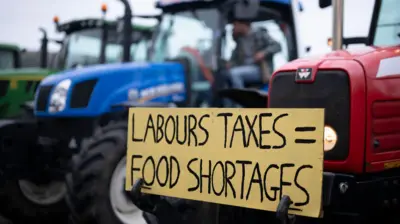We've updated our Privacy and Cookies Policy
We've made some important changes to our Privacy and Cookies Policy and we want you to know what this means for you and your data.
Ireland to ban new petrol and diesel vehicles from 2030
Image source, PA
The Irish government plans to ban the sale of new petrol and diesel vehicles by 2030, as part of a major strategy to protect the environment.
The aim is to ensure that all new cars and vans on Irish roads in 11 years' time are electric vehicles.
The proposed legislation was among 180 measures in the government's , published on Monday.
The document also includes a target to implement an EU-wide ban on non-recyclable plastic by 2030.
Rising emissions
The Climate Action Plan states that the Republic of Ireland is "way off course" in its attempts to achieve its emissions targets.
Unveiling the plan on Monday, the Environment Minister ​Richard Bruton said Ireland was "currently 85% dependent on fossil fuels".
He said that at a time when the state's carbon footprint should be reducing, Ireland's greenhouse gas emissions "have been rising rapidly" and that trend had to be reversed.
He arrived at the launch in Grangegorman, north Dublin, on a hybrid electric bus, accompanied by Taoiseach (Irish Prime Minister) Leo Varadkar and several other members of the cabinet.
Image source, Niall Carson/PA
Mr Bruton said the plan was a roadmap to achieving existing 2030 emissions targets and would put Ireland "on a trajectory to achieve net zero carbon emissions by 2050".
The hope is that by the time the petrol and diesel vehicle ban is introduced in 2030 there will be 950,000 electric vehicles on Irish roads.
The government is set to invest in a "nationwide" charging network to power the new vehicles.
By 2025, at least one recharging point will be required at new non-residential buildings with more than 10 parking spaces.
'Penalties'
In addition to banning the sale of new fossil fuel cars, the government said it would stop granting National Car Test (NCT) certificates to such vehicles by 2045.
The compulsory inspection programme is carried out every year on vehicles that are more than 10 years old.
Mr Bruton said climate targets would be set for every relevant sector of government and public body, including housing; transport; agriculture and the public sector.
The relevant minister will be responsible for achieving the target, with "penalties" if they are not met, he tweeted.
This article contains content provided by Twitter. We ask for your permission before anything is loaded, as they may be using cookies and other technologies. You may want to read Twitter and before accepting. To view this content choose 'accept and continue'.
End of Twitter content
Up to 500,000 homes are to be included in a "retrofit plan" to make them more energy efficient.
As well as the ban on non-recyclable plastic, higher fees will be imposed on the production of materials that are difficult to recycle.
Government departments and bodies have also been instructed to stop buying single-use plastic cups, cutlery and straws.
"Ultimately this is about securing a better, healthier, more resilient future for the country," the minister said.
Opposition parties have given a cautious welcome to the plan, but some claimed it lacked detail and did not focus strongly enough on public transport.
The Green Party and Sinn FГ©in both called for more investment in public transport infrastructure, while Fianna FГЎil complained that the plan was not costed.
Top Stories
More to explore
Most read
Content is not available








